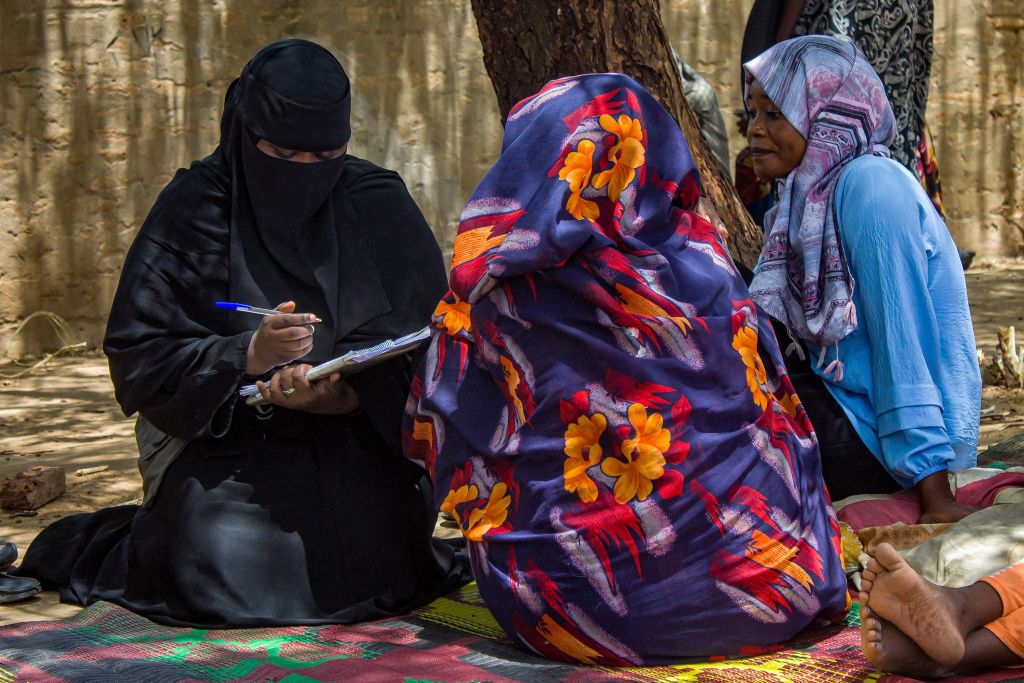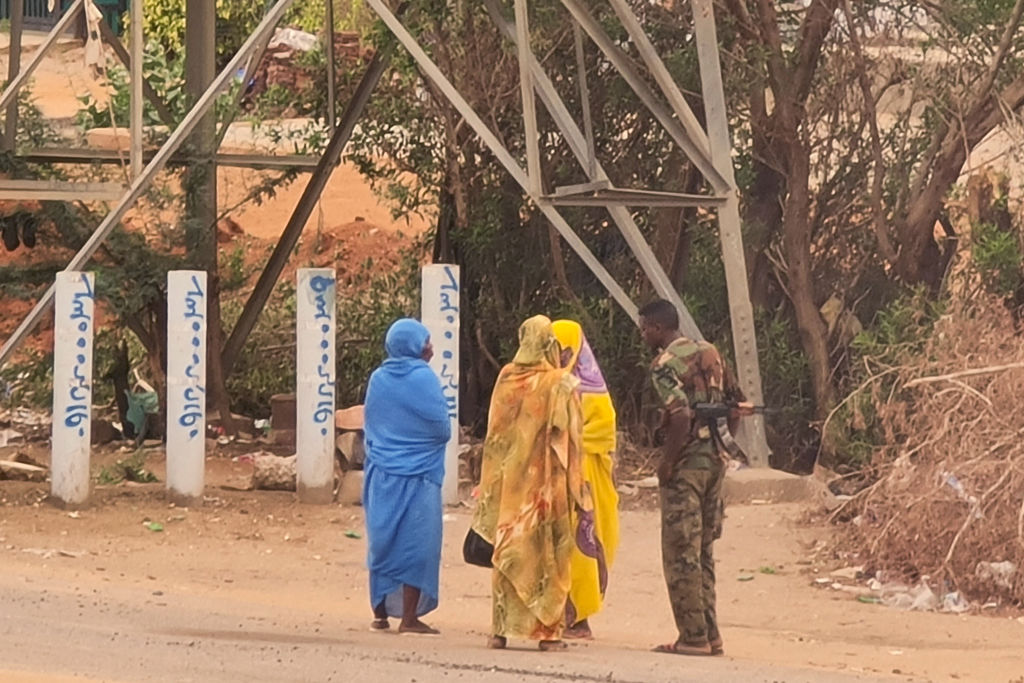On April 15, Fahima Hashim awoke to the sound of her nephew shouting her name. “The war has started!” he yelled. Her family hunkered down in their Khartoum home, hoping the conflict between two warring factions of Sudan’s military would be short-lived, and they’d be able to wait it out.
“I didn’t sleep at night,” Hashim recalled. “I’d sleep when everyone woke up, because I wanted to protect them from anything [that might happen] in their sleep.”
After 14 days, supplies started to run low, and Hashim decided they needed to flee. It wasn’t the first time.
In 2014, Sudan’s military dictator Omar al-Bashir accused Hashim of destroying the fabric of Sudanese society because of her work as the founder of Salmmah Women’s Resource Center, a group that documented violence against women and fought for reforms to Sudan’s legal system. She escaped to Canada and built a new life for herself and her daughter. When al-Bashir fell from power five years later, she thought it would finally be safe to return.
Women like Hashim were at the forefront of a grassroots movement to topple al-Bashir—one of the revolution’s most iconic images was of a young woman named Alaa Salah standing atop a car in front of army headquarters with her finger raised in fierce protest. These women had hoped al-Bashir’s downfall would earn them equal rights and freedoms alongside men at last. Instead, the transitional government—led by fundamentalist military commanders who had served under al-Bashir—sidelined women, continued to emphasize the primacy of Islamic law, and supported a coup in 2021.
Far from securing equality and a seat at the negotiating table, Sudanese women continued to be targeted with sexual violence, systemic exclusion from the political sphere, and imposition of strict dress codes.
“After the revolution, whenever women talked about representation or participation or [the need] to include women’s rights … [male politicians] just said ‘this is actually not the right time’ and ‘these women are so annoying,’” said 31-year-old activist Lina Marwan, who was arrested in January 2019 alongside 86 other young women during intense protests against the al-Bashir administration.
Despite the backslide, women such as Marwan and Hashim refuse to give up. They continue to coalesce in online spaces, leading emergency relief efforts, organizing health care, and helping women and children to flee the country. They’re still fighting for what they’ve demanded for nearly a century: a meaningful seat at the peace talks and a significant role in the governance of a new Sudan.

Sudan has a rich history of strong women’s rights movements that stretches back to the 19th century. The formation of the Sudanese Women’s Union in the 1950s marked a critical moment as women took up the cause of independence from British colonial rule. In 2018-19, their momentous protests against al-Bashir in front of the Army Central Command led to them being called Kandakat after powerful historical queens.
“You could hear in the cell [that] the girls are talking and chatting,” said Marwan about her time in prison during that period. “The girls are beautiful and very strong and have a very revolutionary spirit, and they made a lot of joy inside this dark, lifeless place.”
But Sudanese leaders have always attacked values they deemed antithetical to Islam and Sudanese culture. Sudan’s first dictator, Ibrahim Abboud, banned the Sudanese Women’s Union in 1958. In the 1980s, Jaafar Muhammad Nimeiry’s military dictatorship imposed Islamic law on the country, removing a ban on female genital mutilation in the process. Al-Bashir came to power in 1989 on the back of a military-led Islamization project that institutionalized discriminatory anti-women policies, such as stoning and flogging for women who wore pants or refused to cover their hair.
“The women’s movement has always been a target for dictators. And that shows you how strong the women’s movement was,” said Quscondy Abdulshafi, an advisor at Freedom House, a Washington, D.C.-based think tank.
When al-Bashir fell, Sudanese women saw a wide range of possibilities open up in front of them. Sudan’s new Constitutional Declaration contained strong language about the role of women and a 40 percent quota requirement for women’s participation in parliament. Religion was separated from the state, and al-Bashir’s public order act was repealed—reflecting the hopeful nature of that moment for women.
But the promise was short-lived. The military-led transitional government soon revealed that it had not strayed far from the conservative Islamic ideology of al-Bashir’s regime. On reviewing civil society proposals for a new democratic government, the 10-member military council expressed a key reservation: “The declaration failed to mention the sources of legislation, and the Islamic Sharia law and tradition should be the source of legislation,” Lt. Gen. Shamseddine Kabbashi, a spokesman for the military council, told reporters at a press conference.
Following the 2021 coup, the military leaders dissolved the ruling body instituted by the Constitution Declaration and declared a state of emergency. Then, they turned on themselves. In April, civil war broke up between two rival generals. The transitional government had included the Rapid Support Forces (RSF), a paramilitary unit that faces several accusations of mass rape; this group is now at the forefront of the civil war.
Today, women are experiencing widespread gender-based violence, sexual assault, and rape; pregnant women are struggling to give birth as the health care system crumbles; and women and children make up the majority of the refugee population fleeing across Sudan’s borders.
Since the outbreak of civil war, Sudan’s women’s movement has morphed from fighting for rights to fighting for lives. Women have become key providers of support services and emergency relief.
“Women from civil society all around Sudan, they have a WhatsApp group called Women for Peace,” Marwan said. The group is providing health care for displaced pregnant women and distributing hygiene kits for women and girls.
They’re providing some services for men, but the focus is on women. “Because throughout environmental disasters or anything that’s broken out in Sudan, men started to see women’s needs as secondary,” Marwan explained.
Other groups include Sudanese women doctors based abroad who participate in WhatsApp clinics, providing telemedicine services. Some, such as Sara Abdelgalil, a National Health Service physician in the United Kingdom, are also coordinating with organizations on the ground to provide online training for Sudanese medical students who still have access to the internet.
Meanwhile, from Canada, Hashim is helping high-profile activists escape the country. She’s organizing paperwork and visas with the support of women’s rights organizations, raising money for the harrowing bus journey from Sudan into Egypt, and securing funds to support women with rent and food for at least three months as they settle into their new lives.
Hashim is also engaged with a WhatsApp group called Women Against the War, which supports Sudanese resistance committees.
Foreign-policy experts such as Sanam Naraghi Anderlini, the executive director of the International Civil Society Action Network, a women, peace, and security organization, say research shows that the presence of women can make a massive difference in peacebuilding. Including women as negotiators, mediators, and signatories increases the likelihood of an agreement lasting at least two years by 20 percent, and the likelihood of it lasting at least 15 years by 35 percent.
“[Women] are bringing a very stark human lens into these political power discussions,” Anderlini said. “The women are going to be asking, ‘does your cease-fire include stopping rape? Does it include getting the RSF soldiers out of people’s homes? Stopping the looting? What are the elements of the cease-fire?”
Hashim wants to take it a step further: She believes that a new Sudan will rise only if women take control of the country. She says the women’s movement has already developed its own policies on climate change, health, and reproductive rights. They were working out their preferred educational policies when the war broke out.
“Enough is enough,” Hashim said. “I think men have destroyed Sudan. What has the army done? The war in South Sudan. The war in Darfur. It’s been 67 years since independence, and those men haven’t done anything [for] Sudan. They made it worse.”
“I think we should make a shadow government with all our ministers,” she said. “It can only be done by women, by feminists.”



